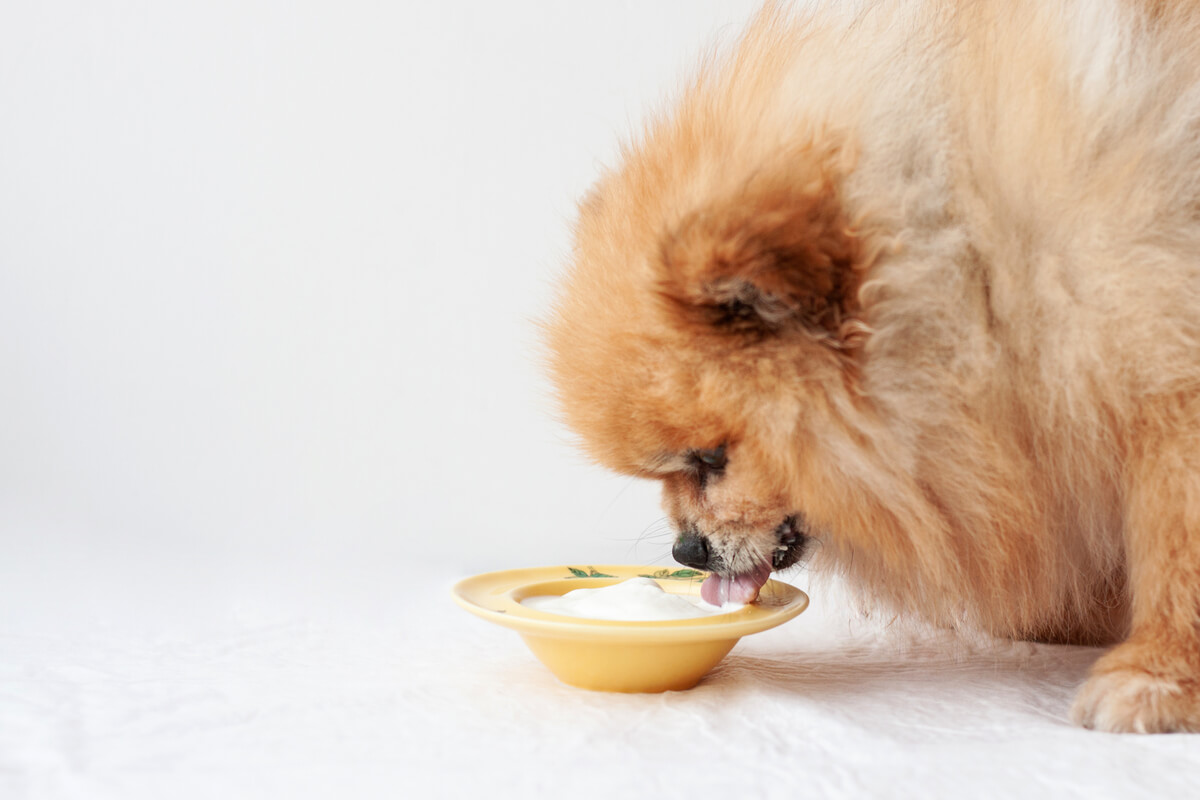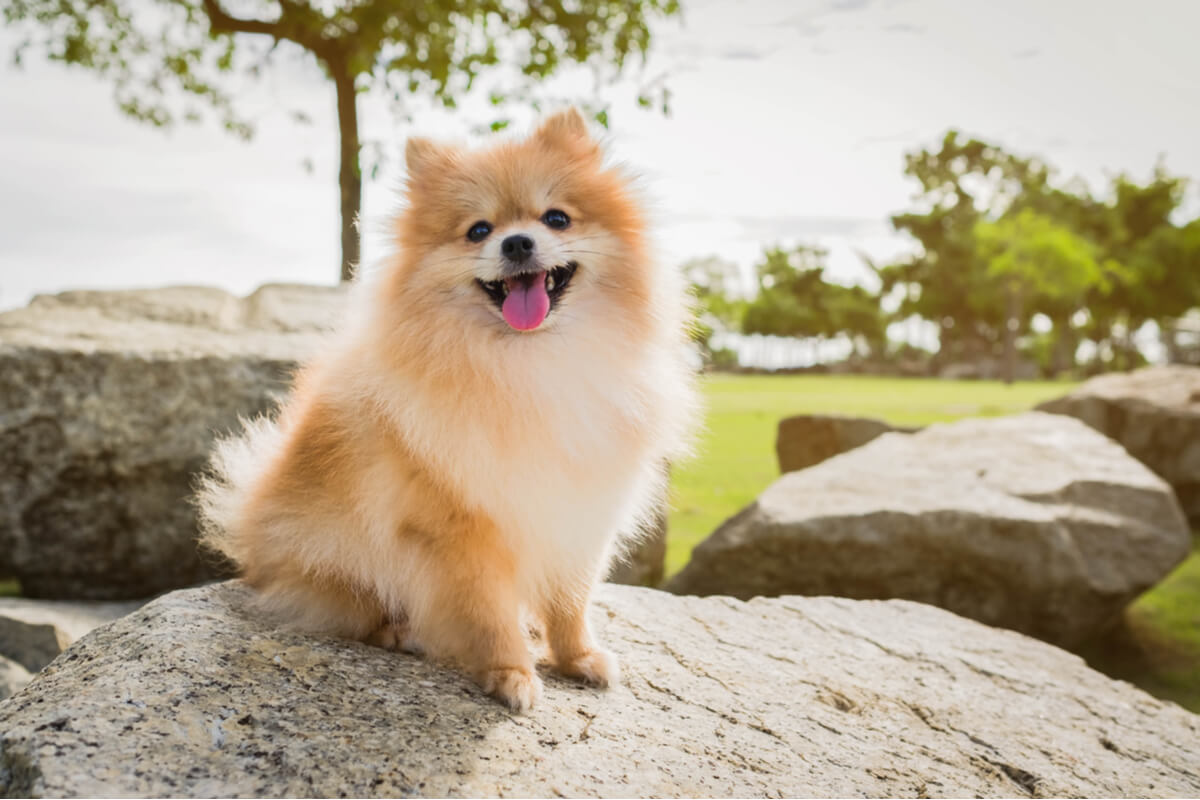How to Care for the Pomeranian


Reviewed and approved by the biologist Samuel Sanchez
The Pomeranian, also known as Deutscher Zwergspitz, German Dwarf Spitz, or Pomeranian Lulu, is a miniature dog that requires certain care in order to be a healthy and happy pet. If you have one of these affectionate and intelligent dogs at home, you should keep in mind certain recommendations to maintain its beautiful appearance.
We’ll tell you how to keep this popular toy dog, named after an area in northeastern Europe (now part of Poland and western Germany), happy and healthy. You’ll also learn about coat maintenance, proper nutrition, and physical activity for a dog that’s related to the mighty Arctic Spitz-type sled dogs.
Caring for the Pomeranian
Like any other pet, this canine needs to have a routine that allows it to live out its life expectancy to the full, which is between 12 and 15 years. The care of this breed should include a balanced diet, good hygiene, vaccination, exercise, and even visits to the vet to make sure your Pomeranian is in optimal health.

Hygiene
To begin with, grooming is essential in your pet, because keeping it clean will help you avoid infections or diseases. We emphasize that the Pomeranian needs a good bath every month or every two months (depending on their level of dirt).
In addition, the products you use to bathe your pet should be of yop quality, especially considering that its coat requires special care. In other words, you’ll need to choose well the shampoo and conditioner well. Bear in mind though that you can’t bathe it until it’s at least 14 weeks old.
Similarly, you should keep a careful watch over the dental hygiene of your dog. The Pomeranian has a tendency to suffer from tartar formation and the development of dental disease, and it needs constant cleaning and check-ups. In addition, you should be aware of the state of their nails, which need to be kept very short.
Besides this, the ears and eyes of the Pomeranian also require proper care. It’s important for the caregiver to check the animal’s ears frequently and clean them when necessary. In addition, the dog’s eyes should be cleaned, as this breed tends to accumulate a lot of dirt in their eyes.
Coat
In addition to the above, the maintenance of the coat is one of the most important care aspects for this breed. The Pomeranian needs to get used to a routine of brushing so that its coat remains knot-free and looking good.
It’s worth noting that this breed acquires its adult coat after 8 months of age, but, before that, it’ll shed almost all its fur in order to get its new coat. This is the ideal time to start the habit of daily brushing. After the molt, the dog will have an abundant and delicate coat of two layers: the external, long, smooth coat, and the internal, short, dense one.
To maintain its coat, we recommend you use different brushes. These are the two basic ones:
- One with soft bristles, double-layered or long bristles to brush the coat daily and in layers, without the need to pull.
- Another type of metal comb to undo very complex knots.
If you can’t brush your Pomeranian’s coat every day, make sure you do it at least 3 times a week. On the other hand, it would be good to go to an expert on the subject to determine the best way to take care of the coat of this toy dog.
Feeding
As indicated by the American Kennel Club the Pomeranian’s diet and nutritional care should always include quality food (either commercially made or prepared at home). This miniature dog needs to be fed according to its age, weight, size, and health.
Calorie intake shouldn’t be exceeded, in order to prevent obesity problems.
In the same way, it’s essential to always provide fresh water to the Pomeranian, as well as to know which human foods are safe and can be a complement to the dog’s diet. In addition to this, the supervision of a veterinarian will always be important, to establish if your pet has the ideal weight and is receiving the right food.
Physical activity
Activity is part of the care of the Pomeranian, because this intelligent breed has a lot of energy. Therefore, it’s necessary to ensure that it takes part in positive activities, such as sports. This will prevent inappropriate behavior in the dog. In short, this pet needs to be kept active and stimulated!
You’ll have to make sure to walk this miniature dog daily and provide games that exercise its mind. The Pomeranian needs to release its energy, so toys will also be helpful to fulfill this purpose.
Health and veterinary checkup
The veterinary checkup plays a key role in your pet’s health, because going to a professional to evaluate their development will help to detect diseases and illnesses in time. Although the Pomeranian is usually a very healthy and long-lived canine, it can also suffer from health complications, such as dental, eye, heart, kidney, or respiratory problems.
You’ll also need to ensure that your four-legged friend has all the vaccinations indicated by the veterinarian, as well as the deworming. In this way, you will be contributing to the animal’s welfare and to your own (because some canine diseases can be transmitted to humans).

Final tips about looking after your Pomeranian
Despite being a dog that requires attention and affection, the Pomeranian likes to have its space, so they won’t always want to be in your arms. Also, keep in mind that this breed isn’t comfortable in cages or confined spaces. It needs physical exercise and other activities to avoid anxiety and stress.
Remember that their coats require a lot of attention and you must have the correct implements to treat it. Regarding exercise, you should avoid long runs. Although this canine is very energetic, its resistance is lower due to its size. Lastly, don’t forget to always offer it quality food and take it for regular check-ups with a veterinarian.
The Pomeranian, also known as Deutscher Zwergspitz, German Dwarf Spitz, or Pomeranian Lulu, is a miniature dog that requires certain care in order to be a healthy and happy pet. If you have one of these affectionate and intelligent dogs at home, you should keep in mind certain recommendations to maintain its beautiful appearance.
We’ll tell you how to keep this popular toy dog, named after an area in northeastern Europe (now part of Poland and western Germany), happy and healthy. You’ll also learn about coat maintenance, proper nutrition, and physical activity for a dog that’s related to the mighty Arctic Spitz-type sled dogs.
Caring for the Pomeranian
Like any other pet, this canine needs to have a routine that allows it to live out its life expectancy to the full, which is between 12 and 15 years. The care of this breed should include a balanced diet, good hygiene, vaccination, exercise, and even visits to the vet to make sure your Pomeranian is in optimal health.

Hygiene
To begin with, grooming is essential in your pet, because keeping it clean will help you avoid infections or diseases. We emphasize that the Pomeranian needs a good bath every month or every two months (depending on their level of dirt).
In addition, the products you use to bathe your pet should be of yop quality, especially considering that its coat requires special care. In other words, you’ll need to choose well the shampoo and conditioner well. Bear in mind though that you can’t bathe it until it’s at least 14 weeks old.
Similarly, you should keep a careful watch over the dental hygiene of your dog. The Pomeranian has a tendency to suffer from tartar formation and the development of dental disease, and it needs constant cleaning and check-ups. In addition, you should be aware of the state of their nails, which need to be kept very short.
Besides this, the ears and eyes of the Pomeranian also require proper care. It’s important for the caregiver to check the animal’s ears frequently and clean them when necessary. In addition, the dog’s eyes should be cleaned, as this breed tends to accumulate a lot of dirt in their eyes.
Coat
In addition to the above, the maintenance of the coat is one of the most important care aspects for this breed. The Pomeranian needs to get used to a routine of brushing so that its coat remains knot-free and looking good.
It’s worth noting that this breed acquires its adult coat after 8 months of age, but, before that, it’ll shed almost all its fur in order to get its new coat. This is the ideal time to start the habit of daily brushing. After the molt, the dog will have an abundant and delicate coat of two layers: the external, long, smooth coat, and the internal, short, dense one.
To maintain its coat, we recommend you use different brushes. These are the two basic ones:
- One with soft bristles, double-layered or long bristles to brush the coat daily and in layers, without the need to pull.
- Another type of metal comb to undo very complex knots.
If you can’t brush your Pomeranian’s coat every day, make sure you do it at least 3 times a week. On the other hand, it would be good to go to an expert on the subject to determine the best way to take care of the coat of this toy dog.
Feeding
As indicated by the American Kennel Club the Pomeranian’s diet and nutritional care should always include quality food (either commercially made or prepared at home). This miniature dog needs to be fed according to its age, weight, size, and health.
Calorie intake shouldn’t be exceeded, in order to prevent obesity problems.
In the same way, it’s essential to always provide fresh water to the Pomeranian, as well as to know which human foods are safe and can be a complement to the dog’s diet. In addition to this, the supervision of a veterinarian will always be important, to establish if your pet has the ideal weight and is receiving the right food.
Physical activity
Activity is part of the care of the Pomeranian, because this intelligent breed has a lot of energy. Therefore, it’s necessary to ensure that it takes part in positive activities, such as sports. This will prevent inappropriate behavior in the dog. In short, this pet needs to be kept active and stimulated!
You’ll have to make sure to walk this miniature dog daily and provide games that exercise its mind. The Pomeranian needs to release its energy, so toys will also be helpful to fulfill this purpose.
Health and veterinary checkup
The veterinary checkup plays a key role in your pet’s health, because going to a professional to evaluate their development will help to detect diseases and illnesses in time. Although the Pomeranian is usually a very healthy and long-lived canine, it can also suffer from health complications, such as dental, eye, heart, kidney, or respiratory problems.
You’ll also need to ensure that your four-legged friend has all the vaccinations indicated by the veterinarian, as well as the deworming. In this way, you will be contributing to the animal’s welfare and to your own (because some canine diseases can be transmitted to humans).

Final tips about looking after your Pomeranian
Despite being a dog that requires attention and affection, the Pomeranian likes to have its space, so they won’t always want to be in your arms. Also, keep in mind that this breed isn’t comfortable in cages or confined spaces. It needs physical exercise and other activities to avoid anxiety and stress.
Remember that their coats require a lot of attention and you must have the correct implements to treat it. Regarding exercise, you should avoid long runs. Although this canine is very energetic, its resistance is lower due to its size. Lastly, don’t forget to always offer it quality food and take it for regular check-ups with a veterinarian.
All cited sources were thoroughly reviewed by our team to ensure their quality, reliability, currency, and validity. The bibliography of this article was considered reliable and of academic or scientific accuracy.
- Pomernia. American Kennel Club. Recogido el 28 de septiembre de 2021 de: https://www.akc.org/dog-breeds/pomeranian/
- Manual para la tenencia responsable de mascotas. Revistas de la Universidad de Antioquia. Recogido el 28 de septiembre de 2021 de: https://revistas.udea.edu.co/index.php/biogenesis/article/view/337027/20792289
This text is provided for informational purposes only and does not replace consultation with a professional. If in doubt, consult your specialist.








